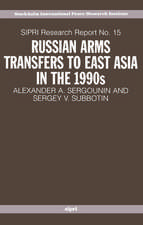Mercenaries, Hybrid Armies and National Security: Private Soldiers and the State in the 21st Century: LSE International Studies Series
Autor Caroline Varinen Limba Engleză Paperback – 30 iun 2020
This book assesses the use of 'mercenaries' by states, and their integration into the national armed forces as part of a new hybridisation trend of contemporary armies.
Governments, especially in the West, are undertaking an unprecedented wave of demilitarisation and military budget cuts. Simultaneously, these same governments are increasingly opening their armies up to foreign nationals and outsourcing military operations to private companies. This book explores the impact of this hybridisation on the values, cohesion and effectiveness of the armed forces by comparing and contrasting the experiences of the French Foreign Legion, private military companies in Angola, and the merging of private contractors and American troops in Iraq.
Examining the employment of foreign citizens and private security companies as military forces and tools of foreign policy, and their subsequent impact on the national armed forces, the book investigates whether the difficulties of coordinating soldiers of various nationalities and allegiances within public-private joint military operations undermines the legitimacy of the state. Furthermore, the author questions whether this trend for outsourcing security can realistically provide a long term and positive contribution to national security.
This book will be of much interest to students of private military companies, strategic studies, international security and IR in general.
| Toate formatele și edițiile | Preț | Express |
|---|---|---|
| Paperback (1) | 255.40 lei 6-8 săpt. | |
| Taylor & Francis – 30 iun 2020 | 255.40 lei 6-8 săpt. | |
| Hardback (1) | 846.86 lei 6-8 săpt. | |
| Taylor & Francis – 10 sep 2014 | 846.86 lei 6-8 săpt. |
Din seria LSE International Studies Series
-
 Preț: 409.31 lei
Preț: 409.31 lei -
 Preț: 281.09 lei
Preț: 281.09 lei -
 Preț: 416.96 lei
Preț: 416.96 lei -
 Preț: 465.49 lei
Preț: 465.49 lei -
 Preț: 410.66 lei
Preț: 410.66 lei -
 Preț: 481.79 lei
Preț: 481.79 lei -
 Preț: 390.57 lei
Preț: 390.57 lei -
 Preț: 408.00 lei
Preț: 408.00 lei - 18%
 Preț: 1164.44 lei
Preț: 1164.44 lei
Preț: 255.40 lei
Preț vechi: 324.10 lei
-21% Nou
48.88€ • 50.84$ • 40.35£
Carte tipărită la comandă
Livrare economică 12-26 aprilie
Specificații
ISBN-10: 0367600420
Pagini: 188
Dimensiuni: 156 x 234 x 20 mm
Greutate: 0.23 kg
Ediția:1
Editura: Taylor & Francis
Colecția Routledge
Seria LSE International Studies Series
Locul publicării:Oxford, United Kingdom
Public țintă
Postgraduate, Professional, and UndergraduateCuprins
Notă biografică
Recenzii
'Examining the various roles and accomplishments of mercenaries, contract professionals, and other non-state warriors in the modern world of war, Varin (Regent's Univ., UK) looks at the French Foreign Legion, American contractors in Iraq, and a variety of actors in various countries in war-torn Africa. Somewhat conflicted by this complicated subject, she sees the French Foreign Legionnaire as “the mercenary soldier par excellence” because that force is made up of all volunteers, is part of the French national armed forces, and understands the dangerous and often fatal nature of the mission. Conversely, she is troubled by the way that “the contractor has become the poster boy for the Iraq War.” Various African examples also intrigue and repel as well. This 154-page book provides a useful introduction to these complexities, and Varin concludes that “Although mercenaries, contractors and legionnaires continue to excite the imagination of the public, they remain uncomfortable symbols of violence.” The author also offers the hope that non-state warriors may be made accountable to the states they serve through hybridization and becoming subject to the legal jurisdiction of the host state'. --C. Potholm II, Bowdoin College
Descriere
This book assesses the use of 'mercenaries' by states, and their integration into the national armed forces as part of a new hybridisation trend of contemporary armies.
Governments, especially in the West, are undertaking an unprecedented wave of demilitarisation and military budget cuts. Simultaneously, these same governments are increasingly opening their armies up to foreign nationals and outsourcing military operations to private companies. This book explores the impact of this hybridisation on the values, cohesion and effectiveness of the armed forces by comparing and contrasting the experiences of the French Foreign Legion, private military companies in Angola, and the merging of private contractors and American troops in Iraq.
Examining the employment of foreign citizens and private security companies as military forces and tools of foreign policy, and their subsequent impact on the national armed forces, the book investigates whether the difficulties of coordinating soldiers of various nationalities and allegiances within public-private joint military operations undermines the legitimacy of the state. Furthermore, the author questions whether this trend for outsourcing security can realistically provide a long term and positive contribution to national security.
This book will be of much interest to students of private military companies, strategic studies, international security and IR in general.













